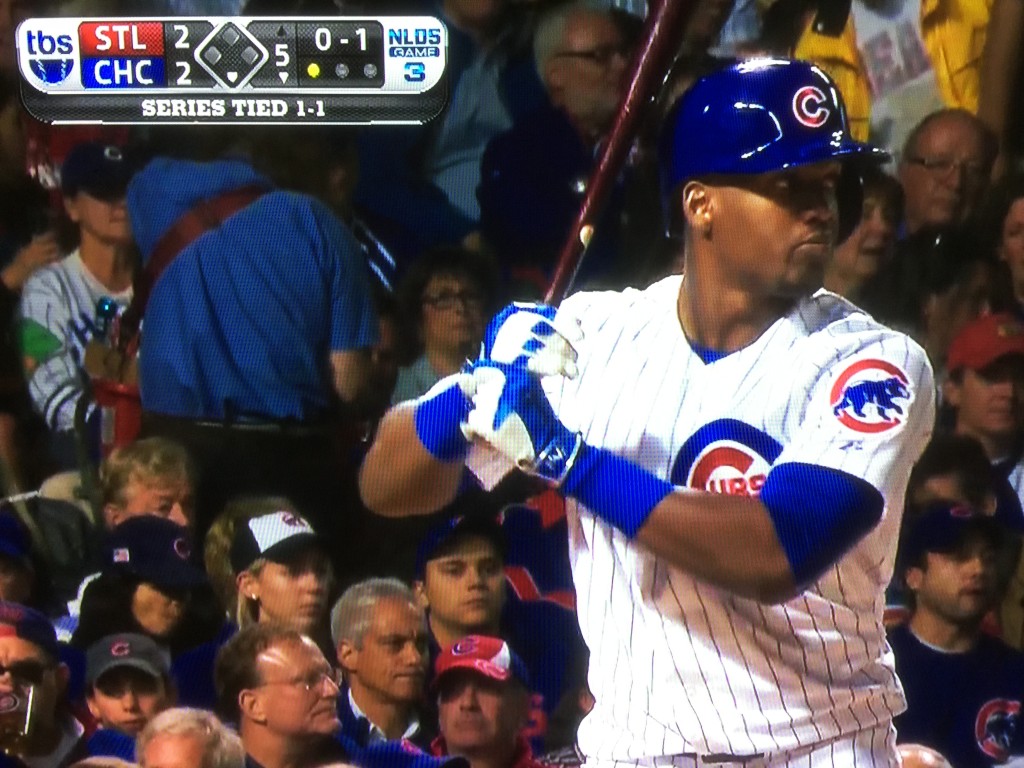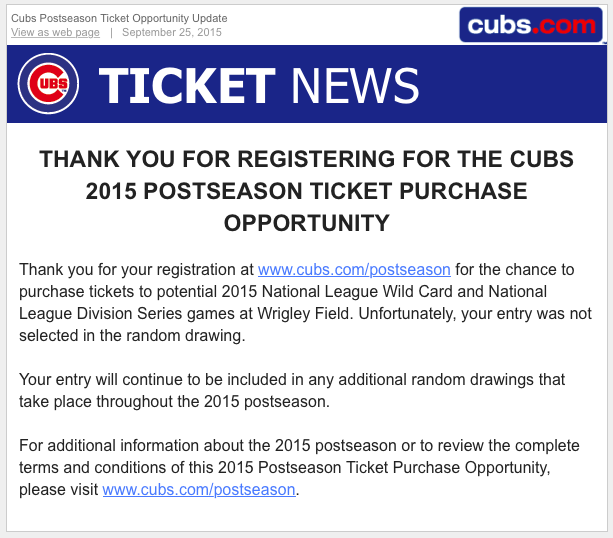Just about every time a right-handed hitter stepped up to the plate during Monday night’s Cubs playoff game against the St. Louis Cardinals, television viewers were treated to the sight of Mayor Rahm Emanuel sitting a few rows back in the crowd near the Cubs dugout.
Turns out his attendance at the game was no coincidence.
The Chicago Sun-Times broke the news that the Chicago Cubs offered to sell tickets to Mayor Emanuel, aldermen, and some state legislators. The Chicago Tribune also reported the story:
[Cubs Spokesman Julian] Green said he saw nothing wrong with the offer.
“They had to pay for the tickets,” Green said. “They weren’t offered at a discount. They weren’t offered comp tickets. They had to pay face value. … We don’t see it as an effort to curry favor when aldermen purchase tickets like everyone else.”
Seriously? Like everyone else?
I tried to buy tickets to the game. That required me to register online for a lottery. Then I had to wait patiently until I received this email:
The elected officials didn’t need to register for a lottery, and they certainly didn’t get the same email I did.
Of course, had I been willing I could have bought a scalped ticket for some exorbitant amount of money. Fortunately for our elected officials, they didn’t need to resort to that, since they were offered their tickets at face value.
Unfortunately for them, the Chicago Governmental Ethics Ordinance defines any thing of value given without fair market value consideration as a gift. Paying face value is not the same as paying fair market value.
A review of eBay ticket transactions for Monday’s game shows that comparable tickets generally sold for $250 – $350 per ticket. These prices should be considered the fair market value for these tickets. The difference between that and the face value of $64 – 74 paid by the elected officials is at least $176 per ticket, and each official was offered two tickets. It appears that this amount should be considered a gift, and under the Ethics ordinance, gifts to elected officials of more than $50 in one year are prohibited.
“Except as otherwise provided in this chapter, no city official, candidate for city office, or employee, and, subject to subsection (g) no covered relative, shall knowingly accept any gift, unless the total value of all gifts given to the official, candidate for city office, employee or covered relative by a single source amounts to no more than $50.00 in a calendar year.” [emphasis added]
In other words, the elected officials were barred from accepting these tickets unless they paid fair market value for them. Since some officials might find this confusing, the Board of Ethics provides them with guidance about gifts.
Before accepting any gift, ticket to admission to an event or dinner, or offer of business travel, City employees and officials (and persons who wish to offer something of value to a City employee or official) should consider not only whether the law permits them to accept it, but whether accepting it may create the perception that their independent judgment could be compromised. When in doubt, it is always safest to say “no thank you” or pay fair market value for anything offered. [emphasis added]
Again, note that the Board of Ethics says to pay fair market value, which was not done in this case.
This is not the first time baseball playoff tickets have figured in a local ethics scandal. In 1993, four employees of the Illinois Commerce Commission (ICC), which regulates utility companies, attended a White Sox American League Championship Series (ALCS) game against the Toronto Blue Jays with tickets they purchased from Commonwealth Edison.
ComEd Vice President Donald Petkus told the Tribune’s John Kass at the time that he “arranged for the ICC staff to buy the $40 tickets at face value” and that “he did not consider the ticket arrangement an ethical violation because the company did not give the tickets as an outright gift.” Sound familiar?
“Scalpers were getting far more than face value on the street outside the ballpark,” Kass noted.
The ICC immediately launched an investigation, with a spokesperson noting that the incident “does raise the appearance of impropriety.” The four staff members were quickly reassigned and reprimanded.
Someone needs to investigate whether these ticket purchases violated the law. It’s too bad the ethical oversight of the City Council is such a mess, with Legislative Inspector General Faisal Khan on his way out, and no clarity about what (if anything) comes next. Discussions about authorizing City Inspector General Joe Ferguson to investigate the City Council have not produced any action. At least Ferguson has existing jurisdiction regarding the Mayor.
And in case you were wondering, in 1993 the Blue Jays beat the White Sox in the ALCS and went on to win the World Series over the Philadelphia Phillies.



Fair value or fair market value for sporting events or performances usually is the face-value of the ticket. That’s how the US Senate and some other legislatures determine it. It is the price at which the good or service is being offered to others.
The question is whether the access to the offer is itself a thing of value apart from the ticket.
I’m not excusing this, and it’s probably not appropriate, but I don’t think you can consider scalper prices FMV since it is illegal activity.